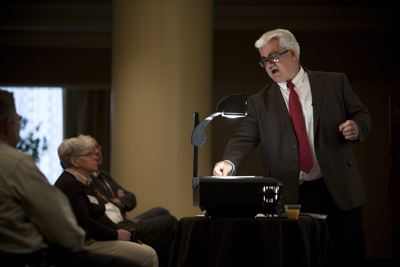U.S. economy will continue to stumble ahead in 2013
By Susan Kelley

The U.S. economy will continue to stumble ahead in 2013 with slow growth, a Cornell macroeconomist predicts. On the global stage, Greece is likely to leave the euro currency zone to alleviate its tough economic situation, he said.
Steven Kyle, professor of applied economics and management, gave his annual assessment and outlook for the national economy Dec. 18. His talk was part of the Agribusiness Economic Outlook Conference, presented by Cornell's Charles H. Dyson School of Applied Economics and Management.
"We're going to have continued slow growth, and vulnerability to shocks. We still do have a debt overhang, we still do have a credit crunch [but] we will gradually work those things off," Kyle said -- that is, unless there is a debt crisis in Europe, which could trigger a major economic disaster that would have implications for the U.S. economy, he added.
Gross domestic product will continue to grow 1 percent to 2 percent unless a war, European Union meltdown or similar large-scale event intervenes. Unemployment "will continue its slow, slow drift downward" to 7 percent by the end of the coming year from the current 7.7 percent, he said.
We won't have to worry about inflation, since continued unemployment and excess capacity will hold down price increases, while at the same time the Federal Reserve will continue to hold short-term interest rates close to 0 percent and long-term interest rates at about 3 percent in 2013, Kyle predicted.
Fiscal policy is a big question, he said. "If I were king, I would let all the Bush era tax cuts -- all of them -- expire," Kyle said, which would solve the structural deficit problem for the long run. And he would institute a stimulus program focused on infrastructure, he said.
In contrast, the Obama administration and Congressional Republicans will create a short-term package of tax increases and spending cuts that will reduce the national deficit slightly, he said. And Democrats and Republicans will compromise to deal with the "fiscal cliff," which is less of a problem than it is made out to be.
What is a potentially big problem is not raising the debt ceiling, and the threat of the U.S. government going into default on its obligations, as occurred in 2011, Kyle said. "I cannot overemphasize how completely irresponsible it would be to replay this," he said. "We have the money to pay our debts. The question is whether we are willing to take our hand out of our pocket and pay them. That's what the debt ceiling crisis is about: not whether we can, but whether we will."
Europe is still key to the global economy, Kyle said. "Europeans are really in a very bad situation," he said, with 25 percent unemployment in Spain and Greece, similar to what the U.S. experienced during its Great Depression. Greece recently voted in another austerity package through September 2013 and can't continue much further down that path, and even the conservative International Monetary Fund now thinks that austerity measures are a bad idea, he said. So, Greece is likely to leave the eurozone.
That won't necessarily affect the U.S. economy, he said. But if central European authorities allow Spain, Portugal and Ireland to leave the eurozone too, it could trigger a major financial catastrophe that would have negative effects in the United States, Kyle said. "I can't imagine they would allow that to happen when they do have the tools to avoid it."
The conference also included sessions on the agricultural, economic and political environment after the presidential election, as well as the current situation and outlook in the sectors of grain and feed; dairy; dairy policy; fruits and vegetables; grapes, wine and ornamentals; and applied research and New York agriculture.
Media Contact
Get Cornell news delivered right to your inbox.
Subscribe